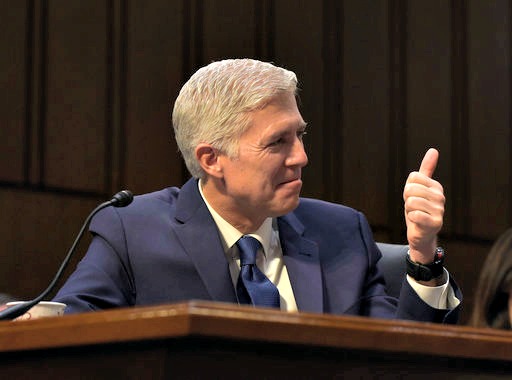
DISTRICT OF COLUMBIA — Supreme Court nominee Neil Gorsuch pledged to be independent or “hang up the robe” as the U.S. Senate began rancorous hearings Monday on President Donald Trump’s conservative pick to fill a Supreme Court seat that has been vacant for more than a year.
In his opening statement, Gorsuch sought to take the edge off Democratic complaints that he has favored the wealthy and powerful in more than 10 years as a federal judge.
Actual questioning of Gorsuch is set to begin Tuesday.
The 49-year-old Coloradan told the Senate Judiciary Committee he has tried to be a “neutral and independent” judge and has ruled both for and against disabled students, prisoners and workers alleging civil rights violations.
“But my decisions have never reflected a judgment about the people before me, only my best judgment about the law and facts at issue in each particular case,” Gorsuch said.
Utah Sen. Orrin Hatch, senior member and former Chairman of the Senate Judiciary Committee, has actively lobbied his fellow legislators and the public to support Gorsuch.
Over the last several weeks, Hatch has addressed the issue on the Senate floor and in opinion pages around the country.
“I have long believed that the Senate owes the President some deference with respect to his qualified nominees,” Hatch said at Monday’s hearing. “Qualifications for judicial service include legal experience, which summarizes the past, and judicial philosophy, which describes the present and anticipates the future. Judge Gorsuch’s legal experience is well-known.
Hatch reminded those at the proceeding that he has served the Senate Judiciary Committee for 40 years. In fact, Hatch has participated in 14 Supreme Court confirmation hearings — more than any Republican in the Senate.
“And some things in the confirmation process never change,” Hatch said. “The conflict over judicial appointments in general, and over this nomination in particular, is a conflict over the proper role of judges in our system of government.”
Read more: Sen. Orrin Hatch’s opening statement.
A Supreme Court confirmation hearing is a major occasion on Capitol Hill — the last one was in 2010.
Democrats, under intense pressure from liberal base voters horrified by the Trump presidency, entered the hearings divided over how hard to fight Gorsuch’s nomination given that the mild-mannered jurist is no right-wing bomb thrower and is widely expected to win confirmation in the end, one way or another.
“Senate Republicans made a big show last year about respecting the voice of the American people in this process,” said Sen. Patrick Leahy, D-Vt. “Now they are arguing that the Senate should rubber stamp a nominee selected by extreme interest groups and nominated by a president who lost the popular vote by nearly 3 million votes.”
Republican senators disputed the Democratic criticism.

“If you believe this has been a great plan to get a Trump nominee on the court you had to believe Trump was going to win to begin with. I didn’t believe it,” said Sen. Lindsey Graham, R-S.C. “I’m trying to hear someone over there tell me why he’s not qualified,” Graham said of Gorsuch.
“These days we sometimes hear judges cynically described as politicians in robes, seeking to enforce their own politics rather than striving to apply the law impartially. If I thought that were true, I’d hang up the robe. But I just don’t think that’s what a life in the law is about,” Gorsuch said.
Several of the more liberal Senate Democrats have already announced plans to oppose Gorsuch and seek to block his nomination from coming to a final vote.
But Republicans could respond to a Democratic delay by eliminating the 60-vote filibuster threshold now in place for Supreme Court nominations, and with it any Democratic leverage to influence the next Supreme Court fight.
Republicans control the Senate 52-48. The filibuster rule when invoked requires 60 of the 100 votes to advance a bill or nomination, contrasted with the simple 51-vote majority that applies in most cases.
Written by MARK SHERMAN and ERICA WERNER, Associated Press. Additional commentary provided by the Office of Sen. Orrin Hatch. Associated Press writer Mary Clare Jalonick contributed to this report.
Email: [email protected]
Twitter: @STGnews
Copyright 2017 The Associated Press. All rights reserved. This material may not be published, broadcast, rewritten or redistributed.